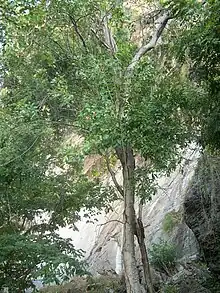| Schinopsis brasiliensis | |
|---|---|
 | |
| Scientific classification | |
| Kingdom: | Plantae |
| Clade: | Tracheophytes |
| Clade: | Angiosperms |
| Clade: | Eudicots |
| Clade: | Rosids |
| Order: | Sapindales |
| Family: | Anacardiaceae |
| Genus: | Schinopsis |
| Species: | S. brasiliensis |
| Binomial name | |
| Schinopsis brasiliensis | |
Schinopsis brasiliensis is a species of flowering plant in the cashew family known by the common names baraúna or braúna.[1]
This species is native to Brazil, Bolivia, and Paraguay.[2] It is a component of the Caatinga ecoregion in northwestern Brazil[3] and the Chiquitano dry forests ecoregion of eastern Bolivia and adjacent portions of Brazil.[4]
Taxonomy
It was first named and described in 1876 by Adolf Engler.[5]
Description
Schinopsis brasiliensis can grow up to 12 metres (39 ft) tall with a trunk diameter of 60 centimeters.[6]
Uses
This tree has a hard, sturdy wood which is used in construction.[1][7] Because of its harvesting for this purpose, the tree is considered an endangered species.[1]
Two species of mite have been noted to live on this tree, Calacarus torulus and Shevtchenkella schinopsidis.[7]
References
- 1 2 3 Cardoso, M. P., et al. (2005). A new alkyl phenol from Schinopsis brasiliensis. Natural Product Research 19(5) 431-33.
- ↑ "Schinopsis brasiliensis". Plants of the World Online. Accessed 15 July 2020.
- ↑ Dantas, B.F.; et al. (2008). "Biochemical changes during imbibition of Schinopsis brasiliensis Engl. seeds". Revista Brasileira de Sementes. 30 (2): 214–9. doi:10.1590/S0101-31222008000200027.
- ↑ "Chiquitano dry forests". Terrestrial Ecoregions. World Wildlife Fund.
- ↑ "Schinopsis brasiliensis | International Plant Names Index". www.ipni.org. Retrieved 2023-08-07.
- ↑ Saraiva, A.M.; et al. "Quantitative analysis of Schinopsis brasiliensis Engl. extract when incorporated into oil-in-water microemulsion" (PDF).
![]() Media related to Schinopsis brasiliensis at Wikimedia Commons
Media related to Schinopsis brasiliensis at Wikimedia Commons